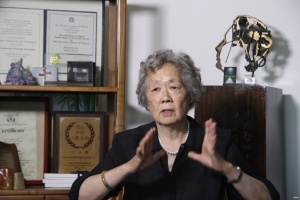Ding Zilin
来自China Digital Space
丁子霖

Ding Zilin is a retired professor, activist, and the co-founder and current leader of Tiananmen Mothers—a political pressure group comprised of family members of pro-democracy protesters killed during the June 4, 1989 military crackdown.
Born on December 20, 1936, Ding Zilin was an associate professor of philosophy at Renmin University in Beijing before retiring, and is the widow of Jiang Peikun (蒋培坤), who was the dean of the Aesthetics Institute at the university and passed away in September 2015. Ding and Jiang's son, Jiang Jielan (蒋捷连), who was 17 at the time and a second-year student at the High School Affiliated with Renmin University, was among the first casualties of the crackdown in Beijing. According to eyewitnesses, Jiang Jielan—who had rushed towards Tiananmen Square against his parents wishes after hearing an "Urgent Warning" on state television urging Beijing residents to stay home—was shot in the chest on June 3 and left to die from blood loss.
Bereaved, Ding launched a personal campaign to investigate her son's death, the names of all others killed and wounded, and to obtain facts to use in determining who should be held accountable for the deadly incident. As Ding continued on this mission, she found help and solidarity from others who had lost family members and loved ones. The group would go on to be called the Tiananmen Mothers, which according to Ding is: "A group of common citizens brought together by a shared fate and suffering."
In 1991, following an interview with ABC, Ding and her husband began to be pressured by the government to maintain silence. In a 1999 interview with CNN's then Beijing Bureau Chief Rebecca MacKinnon, Ding said following the ABC interview, "they wouldn't let me go to class, wouldn't let me take on any research students, wouldn't let us publish anything domestically, expelled me from the party, and confiscated my husband's research. This developed to the point where they secretely detained us. I was detained for more than 40 days. Even after we were released, I was still forced to retire early." Surveillance and other pressure on Ding to remain silent has continued.




